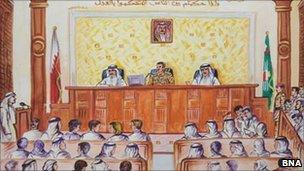Bahrain protests: Trial opens for 47 doctors and nurses
- Published

A sketch of the special security court provided by Bahrain's state news agency
Dozens of doctors and nurses who treated injured protesters in Bahrain have appeared in court charged with attempting to topple the monarchy.
The 47 medics appeared in a special military court in Manama.
They have been held since March, when Bahrain declared an emergency law, which was only lifted last week.
Bahrain's mainly Shia protesters have been calling for democratic reforms and more rights for the country's Shia majority in the Sunni-ruled kingdom.
Hundreds of opposition supporters have been detained since March, when Bahrain's rulers called in military support from its Gulf Arab neighbours - mostly Saudi Arabia and the UAE - to suppress the protests.
More than 20 people were killed during the government's campaign to stifle the demonstrations. Two people have been sentenced to death for their part in the protests. Four have died in police custody.
Court restrictions
Only select journalists are allowed to cover the latest trials from inside the special security court, which has military and civilian judges.
In April, Physicians for Human Rights (PHR) expressed concern about attacks on physicians, patients and unarmed civilians since protests began in February. It said dozens of medics have been arrested - some by masked men in the middle of the night.
The Bahraini authorities have denied targeting medics, saying some of Bahrain's main medical facilities "had been overrun by political and sectarian activity".
Since the lifting of the emergency law, small protests have been held in Shia villages, but they have been quickly dispersed by police using tear gas, rubber bullets, sound grenades and birdshot (small metal pellets), videos on YouTube appear to show.
Bahrain's ruler, King Hamad al-Khalifa, has announced that a national dialogue on reform will begin next month.